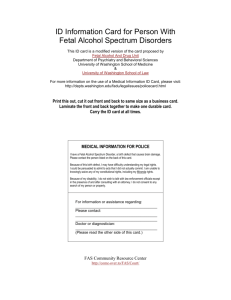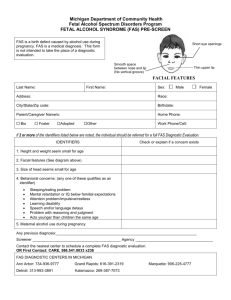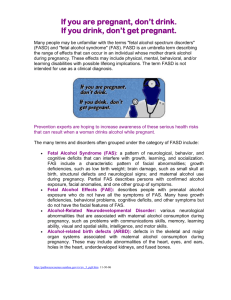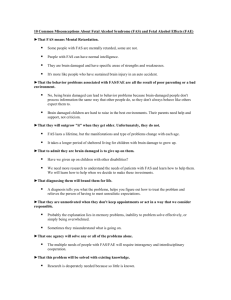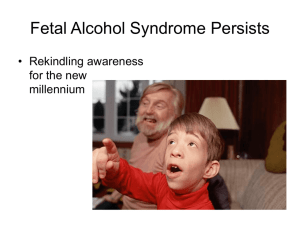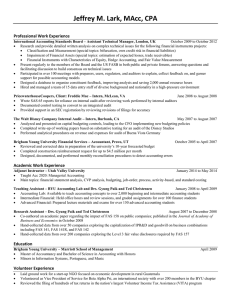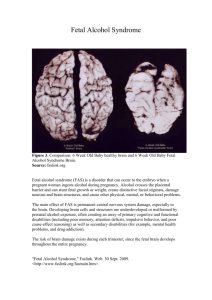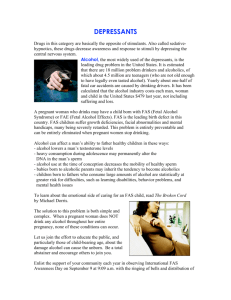pa0705012.ppt
advertisement
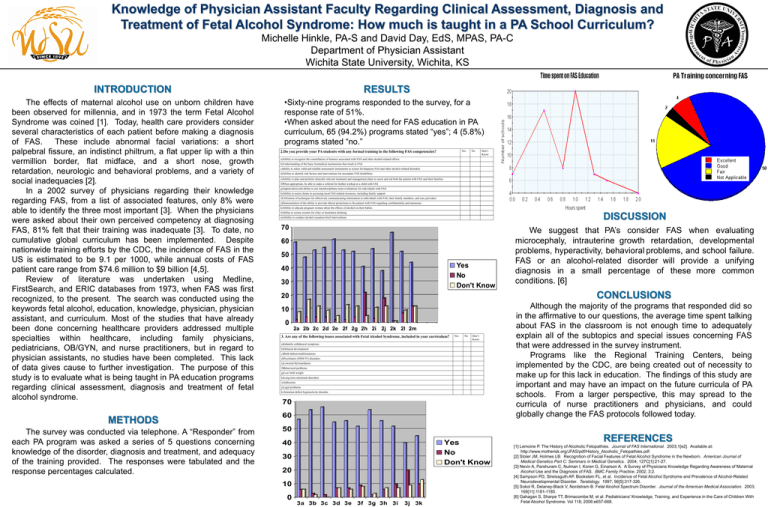
Knowledge of Physician Assistant Faculty Regarding Clinical Assessment, Diagnosis and Treatment of Fetal Alcohol Syndrome: How much is taught in a PA School Curriculum? Michelle Hinkle, PA-S and David Day, EdS, MPAS, PA-C Department of Physician Assistant Wichita State University, Wichita, KS INTRODUCTION The effects of maternal alcohol use on unborn children have been observed for millennia, and in 1973 the term Fetal Alcohol Syndrome was coined [1]. Today, health care providers consider several characteristics of each patient before making a diagnosis of FAS. These include abnormal facial variations: a short palpebral fissure, an indistinct philtrum, a flat upper lip with a thin vermillion border, flat midface, and a short nose, growth retardation, neurologic and behavioral problems, and a variety of social inadequacies [2]. In a 2002 survey of physicians regarding their knowledge regarding FAS, from a list of associated features, only 8% were able to identify the three most important [3]. When the physicians were asked about their own perceived competency at diagnosing FAS, 81% felt that their training was inadequate [3]. To date, no cumulative global curriculum has been implemented. Despite nationwide training efforts by the CDC, the incidence of FAS in the US is estimated to be 9.1 per 1000, while annual costs of FAS patient care range from $74.6 million to $9 billion [4,5]. Review of literature was undertaken using Medline, FirstSearch, and ERIC databases from 1973, when FAS was first recognized, to the present. The search was conducted using the keywords fetal alcohol, education, knowledge, physician, physician assistant, and curriculum. Most of the studies that have already been done concerning healthcare providers addressed multiple specialties within healthcare, including family physicians, pediatricians, OB/GYN, and nurse practitioners, but in regard to physician assistants, no studies have been completed. This lack of data gives cause to further investigation. The purpose of this study is to evaluate what is being taught in PA education programs regarding clinical assessment, diagnosis and treatment of fetal alcohol syndrome. RESULTS •Sixty-nine programs responded to the survey, for a response rate of 51%. •When asked about the need for FAS education in PA curriculum, 65 (94.2%) programs stated “yes”; 4 (5.8%) programs stated “no.” Yes 2.Do you provide your PA students with any formal training in the following FAS competencies? No Don’t Know a)Ability to recognize the constellation of features associated with FAS and other alcohol-related effects b)Understanding of the basic biomedical mechanisms that result in FAS c)ability to select valid and reliable assessment instruments to screen for/diagnose FAS and other alcohol-related disorders d)Ability to identify risk factors and interventions for secondary FAS disabilities e)Ability to plan and perform clinically relevant treatment and management plans to assist and aid both the patient with FAS and their families f)When appropriate, be able to make a referral for further workup in a child with FAS g)Appreciation and ability to use interdisciplinary team evaluations for individuals with FAS h)Ability to assist clients in accessing local FAS-related resources, including family support i)Utilization of techniques for effectively communicating information to individuals with FAS, their family members, and care providers j)Demonstration of the ability to provide ethical protections to the patient with FAS regarding confidentiality and autonomy k)Ability to educate pregnant women about the effects of alcohol on their babies l)Ability to screen women for risky or hazardous drinking DISCUSSION m)Ability to conduct alcohol cessation brief interventions 70 60 50 Yes No Don't Know 40 30 CONCLUSIONS 20 10 0 2a 2b 2c 2d 2e 2f 2g 2h 2i 2j 2k 2l 2m 3. Are any of the following issues associated with Fetal Alcohol Syndrome, included in your curriculum? Yes No Don’t Know a)Infantile withdrawal symptoms b)Delayed development c)Birth defects/malformations d)Psychiatric (DSM IV) disorders e)Lowered IQ/retardation f)Behavioral problems g)Low birth weight h)Long term emotional disorders i)Addictions j)Legal problems k)Attention deficit hyperactivity disorder 70 METHODS 60 The survey was conducted via telephone. A “Responder” from each PA program was asked a series of 5 questions concerning knowledge of the disorder, diagnosis and treatment, and adequacy of the training provided. The responses were tabulated and the response percentages calculated. 50 We suggest that PA’s consider FAS when evaluating microcephaly, intrauterine growth retardation, developmental problems, hyperactivity, behavioral problems, and school failure. FAS or an alcohol-related disorder will provide a unifying diagnosis in a small percentage of these more common conditions. [6] Yes No Don't Know 40 30 20 10 0 3a 3b 3c 3d 3e 3f 3g 3h 3i 3j 3k Although the majority of the programs that responded did so in the affirmative to our questions, the average time spent talking about FAS in the classroom is not enough time to adequately explain all of the subtopics and special issues concerning FAS that were addressed in the survey instrument. Programs like the Regional Training Centers, being implemented by the CDC, are being created out of necessity to make up for this lack in education. The findings of this study are important and may have an impact on the future curricula of PA schools. From a larger perspective, this may spread to the curricula of nurse practitioners and physicians, and could globally change the FAS protocols followed today. REFERENCES [1] Lemoine P. The History of Alcoholic Fetopathies. Journal of FAS International. 2003;1[e2]. Available at: http://www.motherisk.org/JFAS/pdf/History_Alcoholic_Fetopathies.pdf. [2] Stoler JM, Holmes LB. Recognition of Facial Features of Fetal Alcohol Syndrome in the Newborn. American Journal of Medical Genetics Part C: Seminars in Medical Genetics. 2004; 127C[1]:21-27. [3] Nevin A, Parshuram C, Nulman I, Koren G, Einarson A. A Survey of Physicians Knowledge Regarding Awareness of Maternal Alcohol Use and the Diagnosis of FAS. BMC Family Practice. 2002; 3:2. [4] Sampson PD, Streissguth AP, Bookstein FL, et al. Incidence of Fetal Alcohol Syndrome and Prevalence of Alcohol-Related Neurodevelopmental Disorder. Teratology. 1997; 56[5]:317-326. [5] Sokol R, Delaney-Black V, Nordstram B. Fetal Alcohol Spectrum Disorder. Journal of the American Medical Association. 2003; 169[11]:1181-1185. [6] Gahagan S, Sharpe TT, Brimacombe M, et al. Pediatricians' Knowledge, Training, and Experience in the Care of Children With Fetal Alcohol Syndrome. Vol 118; 2006:e657-668.
